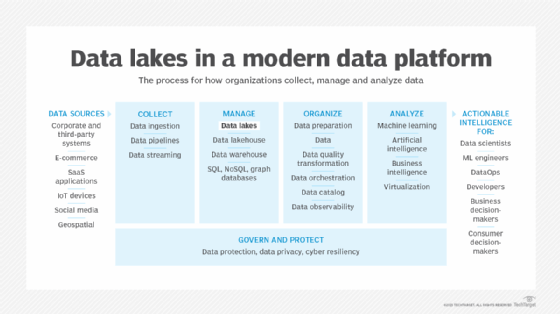Data lakes: Key to the modern data management platform
Data lakes influence the modern data management platform at all levels. Organizations can gain faster insights, save costs, improve governance and boost self-service data access.
Data lakes are popular as organizations have sought to harness the power of big data, machine learning and analytics.
A data lake is a large, centralized repository that stores all types of data in its native format. This data can then be analyzed and processed to extract valuable insights. This blog post will discuss the rise of data lakes and their role in modern data management.
One of the main drivers of the rise of data lakes is the explosion of data. With the proliferation of internet-connected devices, IoT, 5G-enabled platforms, and the growth of e-commerce and social media, organizations generate more data than ever before. Data lakes provide a scalable and cost-effective way to store and manage large volumes of data.
Another factor driving the rise of data lakes is the need for real-time data analysis. In traditional data warehouses, data must be processed and transformed before it can be analyzed. This process can be time-consuming and can delay the delivery of insights. On the other hand, data lakes allow organizations to analyze data in real time, providing immediate insights that can inform decision-making.
Data lakes play a critical role in modern data management in the following ways:
Data storage and management. Data lakes provide a centralized repository for all types of data, including structured, semi-structured and unstructured data. This makes it easier for organizations to store and manage large volumes of data. Additionally, data lakes support a variety of data formats and data types, which makes it easier for organizations to integrate data from different sources.
Data analysis and processing. Data lakes provide a scalable and cost-effective platform for data analysis and processing. Data can be analyzed in real time, which enables organizations to extract valuable insights and make informed decisions. Data lakes also support a variety of analytics tools, such as machine learning, artificial intelligence and data visualization, which can uncover patterns and trends in data.
Data governance and security. Data lakes provide a centralized platform for data governance and security. Data governance policies can be enforced at the data lake level, which ensures that data is stored, managed and accessed in a compliant manner. Additionally, data lakes provide powerful security features, such as encryption and access controls, which can help organizations protect sensitive data.
Data integration and interoperability. Data lakes provide a platform for data integration and interoperability. Data from different sources can be integrated into the data lake, which makes it easier for organizations to combine data from different sources and gain a comprehensive view of their data. Additionally, data lakes support a variety of data integration tools, which makes it easier for organizations to integrate data from different sources, including database applications.
Agile data processing and faster insights. Data lakes enable agile data processing, enabling organizations to quickly process and analyze large volumes of data in real time. This speed of data processing enables faster insights and decision-making, which is crucial in today's fast-paced business environment. Data lakes support a range of data processing technologies, such as Apache Spark and Hadoop, which allow for parallel processing of data, leading to faster insights.
Cost-effective data storage. Data lakes can store large volumes of data at a relatively low cost. They enable organizations to store data in their native format, which reduces the need for expensive data transformation and processing. Additionally, data lakes can deploy on cloud platforms, such as Amazon Web Services, Microsoft Azure and Google Cloud, which provide a cost-effective way to store and manage data.
Self-service data access. Data lakes enable self-service data access, allowing users to access the data they need without the need for IT intervention. This self-service approach reduces the burden on IT teams, enabling them to focus on more strategic tasks. Data lakes provide a single source of truth for data, which ensures that all users have access to the same data, reducing the risk of data silos.
Scalability and flexibility. Data lakes provide scalability and flexibility, enabling organizations to adapt to changing data management needs. As data volumes grow, data lakes can scale to accommodate the increased data storage and processing requirements. Additionally, data lakes support a range of data sources and data types, making them highly flexible and adaptable.
Improved data quality. Data lakes can improve data quality by enabling organizations to perform data cleansing and data validation tasks on incoming data. This helps to ensure that data is accurate and of high quality, leading to better insights and decision-making.
Integration with other data management tools. Data lakes can integrate with other data management tools, such as data warehouses, databases and data catalogs, enabling organizations to create a comprehensive data management ecosystem. This integration enables organizations to capitalize on the strengths of different data management tools, leading to more powerful data management capabilities.

Data lakes have become an essential tool for the modern data management platform. They provide a scalable and cost-effective platform for storing and managing large volumes of data, and they support real-time data analysis and processing. Additionally, data lakes provide a centralized platform for data governance and security, data integration and interoperability.
As data continues to grow in importance for organizations, data lakes are likely to become even more critical for modern data management.








